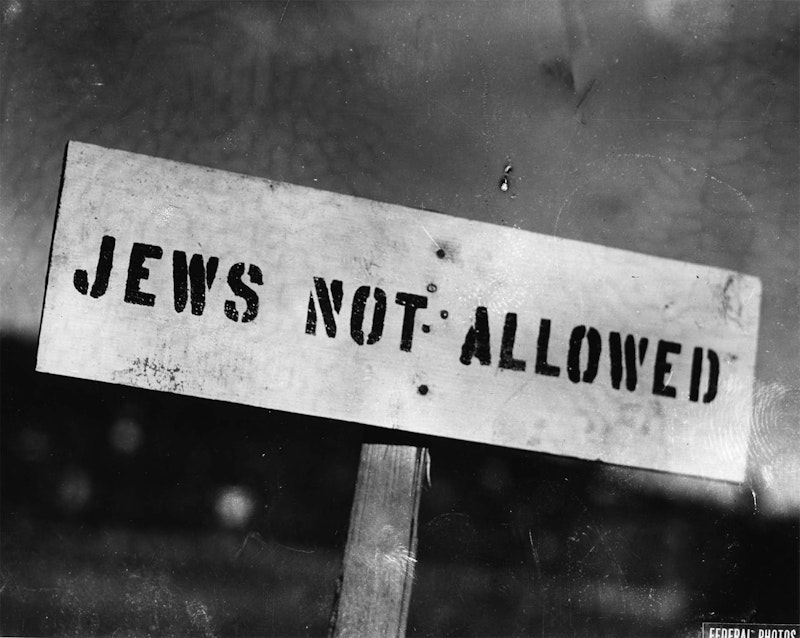The handyman, that reprehensible fool, once got jealous of me. He had his eyes on a lady friend, a large and bronzily handsome woman with whom he’d fallen in love after many years of companionable drinking. Early in this love he’d bristle when another man went near her, as I learned one evening. He and Lily were drinking their beers in front of the set when I dropped by. In the right mood Lily can give a lot of airtime to some simple how-are-you’s, with many loud exclamations and digressions to mark her thoughts; she was in that kind of mood now. The TV was noisy, so I answered from about a dozen feet off (the room had once been our building’s garage and offered a good deal of floorspace). Still too near, I suppose. The handyman fumed a while and then hunched toward her. “He’s a Jew,” he said, or hissed. Lily, being the sort of person to announce that she loves Jews, did so now. “So?” she said. “I love Jews.” For the sake of cliché, I put in “Jesus was a Jew.” Lily took up the thought. “Jesus was a Jew,” she told the handyman. He fell silent and watched the set.
The point of the episode is that I didn’t mind. He flopped, so that’s one thing, and Lily doesn’t interest me, which is another, and I always knew the handyman was an idiot and kind of a louse, not to mention his being constantly drunk. Still, some trivial-sounding burrs have stayed with me forever, and nothing I suffered from the handyman has ever done that. We’d yell and then move on, which I’ve always heard is how people handle these things. When I thought of a past incident, I’d shake my head. “God, that moron. What a fucking idiot,” I’d say. All in all not a big deal.
That’s different from my usual, and the reason comes back to my new favorite subject. I’m autistic and I feel like most people take advantage of it, and the closer we’re supposed to be the more they do so. But not the handyman. Logistically his opportunities were reduced, since my autism hits the worst when it comes to looking people in the face. Most often he and I would be sitting side by side and facing the TV set, his favorite position in life. I didn’t feel pinned by the immobilization that somebody’s eyes can bring on me. But I’ll give him more credit than that. He knew I’m clumsy and he also knew that I’m alone, that talking to people is hard for me. Just twice he was snotty about these subjects, one time apiece. I compiled the same record regarding him. I made a crack about his lack of teeth and one about his lack of education. Each time he told me it hurt, so I dropped it. (His height and speech patterns were fair game; he didn’t mind those.)
The handyman was often rude and selfish. But I could yell at him about it. The other rude people I’ve known require you to act like they’re reasonable and polite; otherwise you’re being out of line. I don’t even mean if you yell at them, just if you push back. Their response tends to sandbag me, since I always think other people are the normal ones and decide what’s normal behavior. The handyman spent very little time setting or policing such requirements. Don’t poke him, don’t steal his beers, don’t talk when he wants to hear the TV, don’t blow your nose at the movies—those were his rules. He cared about his comfort, and the idea of difference wasn’t something he found uncomfortable.
We had a friend, a gentle young college student. “Oh, he is like a girl,” the handyman said one time. “His voice is soft like a girl. He is delicate like a girl.” He didn’t say this to put the fellow down; he was just appreciating life’s variety. The old anti-Semite didn’t even mind Jews. They were just that way (meaning how he imagined them to be) and it baffled him that I got mad when he said so. But he could accept it. He didn’t mind any of my oddnesses. I’ve known a lot of people who had the right opinions, but not so many who were tolerant. The handyman was tolerant and it took me years to realize that’s why I liked him.

